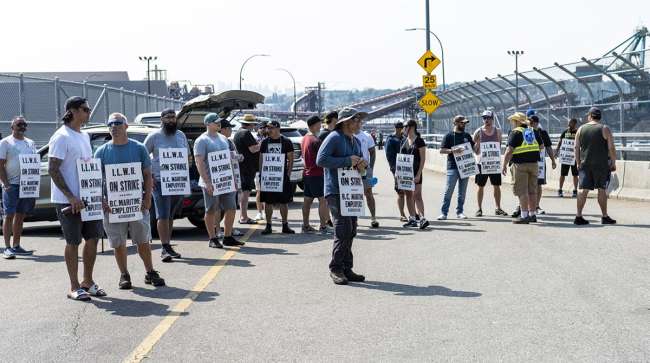Bloomberg News
Now Canada Dockworkers Won't Go Back on Strike After All

[Stay on top of transportation news: Get TTNews in your inbox.]
Workers at Canada’s west coast ports withdrew plans to go back on strike, just hours after threatening to restart a disruption that would have paralyzed shipments at the country’s busiest maritime hub.
The International Longshore and Warehouse Union had told workers late July 18 to go back on strike after rejecting a tentative contract. That decision was ruled “unlawful” on July 19 by Canada’s industrial-relations board because the union failed to give 72 hours of notice.
So the union gave that notice, warning that a strike would instead begin July 22 at 9 a.m. Vancouver time. It then canceled it, according to a statement July 19 that didn’t give reasons or further details.
“The past 24 hours have demonstrated that this continues to be a fluid and unpredictable situation,” the BC Maritime Employers Association, which employs the union’s workers, said in a statement. The group said it would say more once it receives clarification.
More than 7,000 workers at British Columbia ports had already been on strike July 1 to July 13 before a tentative agreement briefly put an end to the walkout. But the union’s caucus rejected the deal.
Labor Minister Seamus O’Regan’s office said workers are expected to return to their jobs July 20, but the government is ready for any eventuality if things change.
#ILWU pic.twitter.com/29cNagZXGZ — joulenejoulene (@joulenejoulene) July 20, 2023
The board of trade in Vancouver, Canada’s most important port, has estimated the strike has so far disrupted C$10.6 billion ($8.1 billion) worth of cargo. Several industry groups, including the Canadian Chamber of Commerce and the Forest Products Association of Canada, have demanded action from Prime Minister Justin Trudeau’s government to end the strike.
The government has been reluctant to issue back-to-work legislation, given that it has an alliance in parliament with a union-friendly opposition party.
Trudeau met with ministers and senior officials July 19 and “stressed the critical importance of resuming operations,” according to a statement. He also “directed them to pursue all available options to ensure the stability of our supply chains and to protect Canadian jobs and our economy.”
The turmoil at the ports is being felt in Canada’s agricultural sector. Canpotex, the potash-exporting joint venture of Nutrien Ltd. and Mosaic Co., said earlier it was withdrawing all new sales offers. Nutrien has curtailed production at two potash mines in Saskatchewan.

How effective have third-party services proved to be for fleets? Let's find out with Michael Precia of Fleetworthy Solutions and Dan Rutherford with Summit Virtual CFO by Anders. Tune in above or by going to RoadSigns.ttnews.com.
The strike had also affected small businesses that were hit with thousands of dollars of storage fees for goods stuck at ports, according to Greg Wilson, director of government relations at the Retail Council of Canada. “This sort of disruption can be the end of a small business,” he said.
The key sticking points in the negotiations appeared to be the length of the agreement and pay raises. The four-year agreement was “far too long” given economic uncertainty, and employers had “not addressed the cost of living issues” that workers have faced, the ILWU said in a statement.
BCMEA, the employers’ group, said the deal was “fair and balanced” and that it would allow workers to receive a 19.2% wage increase over four years, which it described as above industry standards.
The labor unrest shows workers are pushing to recoup purchasing power lost over the past two years, even as the rate of inflation eases. The port strike came just months after federal workers walked out to demand higher wages.
It also points to the possibility that more strike votes could be coming this year. The period of high inflation in the 1970s and 1980s led to a surge in strikes and lockouts in the country, most of which lagged the runup in prices by several months and remained high for years, data on work stoppages in Canada show.
—With assistance from Curtis Heinzl.
Want more news? Listen to today's daily briefing below or go here for more info:




